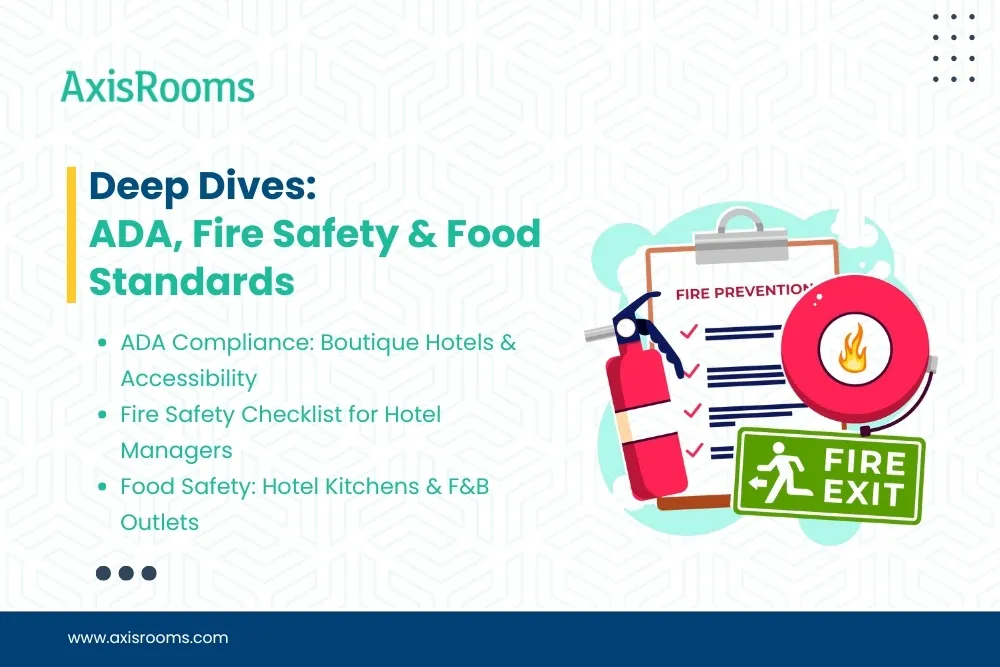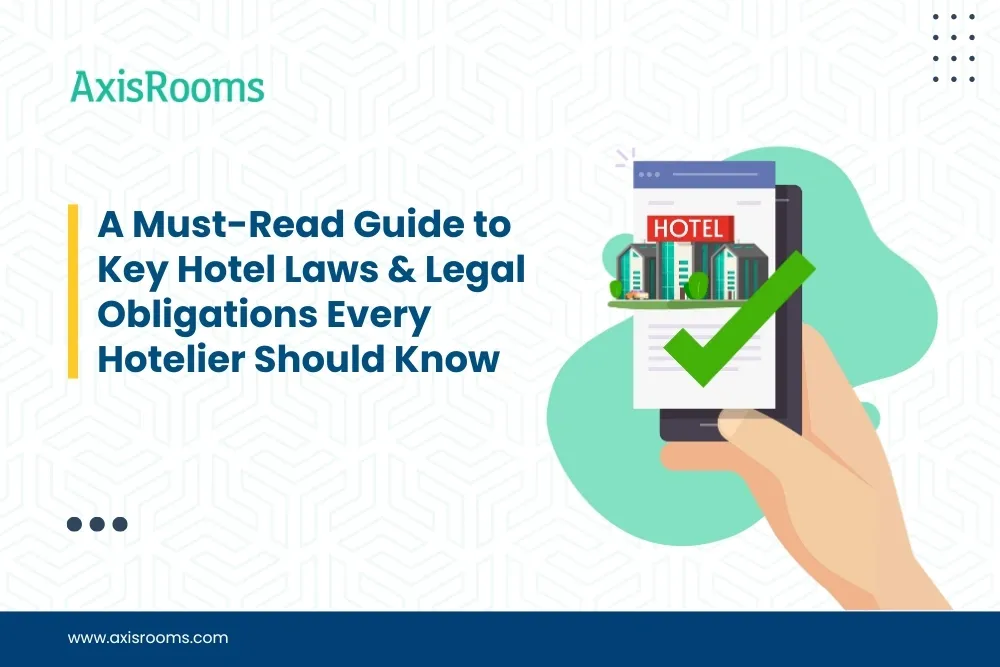From accessibility to labor laws, this hotel legal checklist helps owners meet key obligations and avoid costly mistakes in 2025.
Running a hotel involves more than exceptional guest service — it requires constant awareness of legal obligations that govern every corner of your operation. From accessibility and food safety to licensing and liability, hotel laws form the framework that ensures your business operates securely and ethically.
Failing to meet these obligations can expose your hotel to lawsuits, government penalties, license suspensions, or reputational loss. This comprehensive guide is designed to help hoteliers — especially independent and mid-size operators — stay compliant, avoid costly risks, and build a stronger, legally sound foundation.
Global Hotel Laws at a Glance
Hotel laws differ around the world — but the intention is universally aligned: protect guests, staff, and business operations. These laws dictate how hotels should be built, licensed, operated, and maintained, covering everything from food hygiene to room accessibility.
Key International Frameworks
Understanding these frameworks is the first step in ensuring that your property operates in compliance with local and international hospitality regulations.
Core Areas of Legal Compliance for Hotels

Each of the following areas presents a different layer of legal responsibility — and missing out on even one can affect your hotel’s licensing or credibility.
Legal Compliance
- Hotels must register with the appropriate tourism and municipal authorities and renew business licenses annually.
- Labor law compliance includes minimum wage, gratuity, PF contributions, working hours, and documentation for all employees.
Safety Standards
- Fire extinguishers, smoke detectors, panic alarms, and CCTV coverage are now standard for insurance coverage and guest protection.
- Hotels must conduct mock fire drills, maintain clean exits, and keep maintenance logs up to date.
Hospitality Law
- Governs the contract between the hotel and the guest — including terms of stay, refund conditions, eviction policies, and liability in case of damage or injury.
- Ensures that anti-discrimination laws are enforced in how services are delivered.
Hotel Regulations
- Dictates how land is zoned for hotel use, requirements for parking space, water usage permits, and rules on construction and renovation.
- Encompasses rules for signage, outdoor lighting, and eco-compliance.
Hotel Safety Regulations
- Applies to structural safety, elevator maintenance, pest control, power backup systems, and guest room surveillance.
- Also covers child-safety norms (window locks, swimming pool depth signage, lifeguard availability).
Deep Dives: ADA, Fire Safety & Food Standards

ADA Compliance: Boutique Hotels & Accessibility
Boutique and heritage hotels often operate in older buildings, making ADA (Americans with Disabilities Act) compliance challenging but necessary.
To comply:
- Ensure all public areas (reception, restaurants, common washrooms) are wheelchair-accessible.
- Provide TTY phones, Braille signage, and visual alarms for hearing/visually impaired guests.
- Train your staff to assist disabled guests with dignity and efficiency.
- Ensure your website and digital services are accessible to users with disabilities, including those using screen readers.
RECENT FACT:
In 2024, a California class action lawsuit was filed against Hyatt Hotels alleging their website creates barriers for people who use screen readers, preventing them from accessing services like property maps and booking features. This demonstrates the growing focus on digital accessibility in hospitality.
Fire Safety Checklist for Hotel Managers
Even a minor fire code violation can shut down a hotel or void its insurance.
Food Safety: Hotel Kitchens & F&B Outlets
Food poisoning incidents can quickly damage a hotel’s reputation. Following local and global food safety standards is a legal and moral obligation.
Key standards include:
- Use of FSSAI-certified suppliers (India) or HACCP protocols (EU).
- Regular handwashing drills and protective gear for all kitchen staff.
- Daily refrigerator temperature logs and clear labeling of perishable items.
Region-Specific Compliance Considerations
Every region has unique requirements. A hotel operating in multiple geographies must adapt accordingly.
Hotelier Toolkit: Templates & Best Practices
Instead of guessing or reacting after violations occur, use these templates to proactively audit and maintain legal compliance.
Maintain a physical logbook or use a digital PMS that timestamps each inspection and sends alerts for upcoming renewals. Many hoteliers now rely on PMS integrations to automate such reminders and store documentation digitally in one place.
Common Legal Risks & Real-World Penalties
Legal non-compliance in the hotel industry can lead to more than just fines — it can damage your brand for years.
Examples of What Can Go Wrong
- ADA Violation (USA): A California boutique hotel paid $75,000 in damages for failing to provide accessible restrooms and elevator access.
RECENT FACT:
In 2024, two significant class action battles regarding self-service check-in kiosks’ accessibility to blind guests resulted in a judgment for the plaintiff with a fee petition exceeding $10M. This underscores the critical importance of ensuring all self-service technologies in hotels are accessible.
- Food Safety Breach (India): A 4-star hotel in Pune had its restaurant shut down after serving food contaminated due to improper storage.
- Fire Code Violation (EU): A mid-size hotel in Spain was fined and shut down temporarily after inspectors found blocked exits and expired fire equipment.
Product Spotlight: Simplify Compliance with AxisRooms
- PMS Integrations: Centralize compliance documents and licenses with reminders for renewals.
- Audit Templates: Built-in checklists for food safety, fire inspections, and guest policy management.
- OTA and Channel Manager Integrations: Automatically sync policies across platforms to ensure consistent communication of rules and avoid conflicting terms — a key factor in maintaining compliance.
- Legal Logs & History: Keep a digital trail of all staff training, audits, and policy updates.
AxisRooms isn't just a software — it's your legal compliance assistant built into your daily operations.
Final Thoughts
Every hotel — whether a 10-room boutique property or a 300-room resort — is subject to legal obligations that shape its guest experience and operational integrity. Ensuring legal compliance is not an added task; it’s part of delivering quality hospitality.
From food safety to ADA accessibility, and from staff contracts to fire readiness, compliance is a full-time commitment that pays off in safer operations, better reviews, and lower liability.
FAQs on Hotel Laws
Q1 : What is the most important law every hotel must follow?
A: There’s no single answer — but fire safety, food hygiene, and guest data protection are non-negotiable everywhere.
Q2 : Do small hotels need to comply with accessibility laws?
A: Yes. Even boutique and heritage hotels must offer reasonable accommodations for guests with disabilities.
Q3 : How can I stay updated on changing hotel laws?
A: Subscribe to local hospitality associations, attend safety audits regularly, and use PMS tools that integrate compliance checklists.


